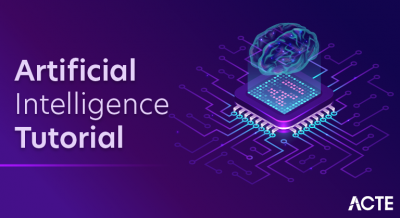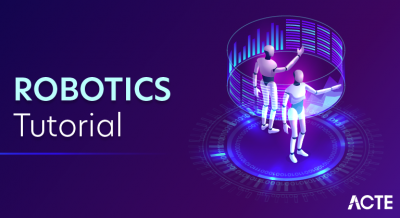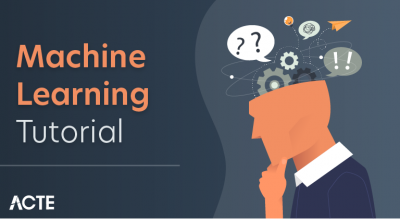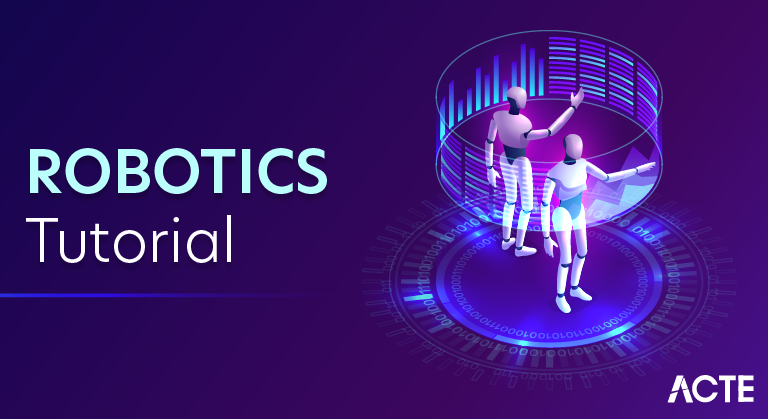
Robotics is the term used in artificial intelligence that deals with a study of creating intelligent and efficient robots.
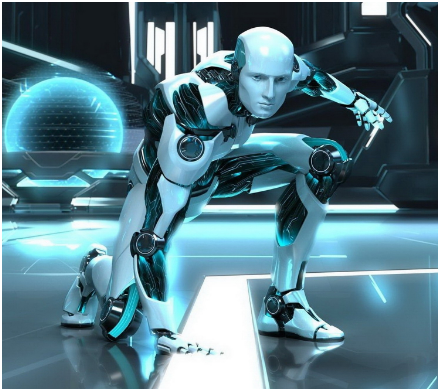
What are Robots
Robots are multifunctional, re-programmable, automatic industrial machine designed for replacing human in hazardous work.
Robots can be work as:-
- An automatic machine sweeper
- In space
- A machine removing mines in a war field
- An automatic car for a child to play with
- In military, etc.
Objective
The aim of the robot is to manipulate the objects by perceiving, moving, picking, modifying the physical properties of object.
What is Robotics
Robotics is a branch of Artificial Intelligence (AI), it is mainly composed of electrical engineering, mechanical engineering and computer science engineering for construction, designing and
application of robots.Robotics is science of building or designing an application of robots. The aim of robotics is to design an efficient robot.
Aspects of Robotics
- The robots have electrical components for providing power and control the machinery.
- They have mechanical construction, shape, or form designed to accomplish a particular task.
- It contains some type of computer program that determines what, when and how a robot does something.
Components of Robot
Consider the robot structure showing different components of robots are:
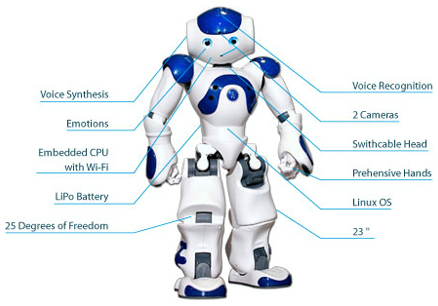
Consider the key components of robotics are:-
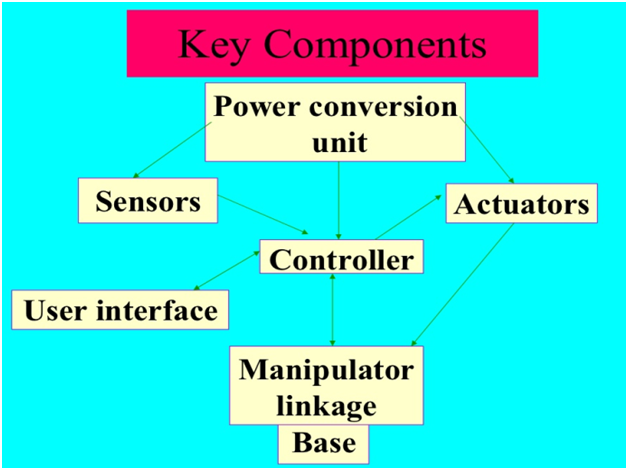
- Power Supply – The working power to the robot is provided by batteries, hydraulic, solar power, or pneumatic power sources.
- Actuators – Actuators are the energy conversion device used inside a robot. The major function of actuators is to convert energy into movement.
- Electric motors (DC/AC)- Motors are electromechanical component used for converting electrical energy into its equivalent mechanical energy. In robots motors are used for providing rotational movement.
- Sensors – Sensors provide real time information on the task environment. Robots are equipped with tactile sensor it imitates the mechanical properties of touch receptors of human fingerprints and a vision sensor is used for computing the depth in the environment.
- Controller – Controller is a part of robot that coordinates all motion of the mechanical system. It also receives an input from immediate environment through various sensors. The heart of robot’s controller is a microprocessor linked with the input/output and monitoring device. The command issued by the controller activates the motion control mechanism, consisting of various controller, actuators and amplifier.
Artificial Intelligence in Robotics
With the invention of machines or computers, their capability to perform different tasks went on increasing exponentially. Humans have developed the power of computer systems in terms of diverse working domains, with increasing speed, and reducing size with respect to time.
What is Artificial Intelligence
According to the founder of Artificial Intelligence, John McCarthy, it is “The engineering and science developed intelligent machine, especially an intelligent computer programs”.
It is a way of developing a computer, a computer-controlled robot, or software that think intelligently, in a similar manner the intelligent humans think.
Artificial Intelligence is implemented by studying how human brain thinks and how humans decide, learn, and work while trying to solve a problem, and then using the result of this study as a basis of developing intelligent systems and software.
Goals of Artificial Intelligence
- For Implementing Human Intelligence in Machines – Creating systems that understand, learn, think and behave like humans.
- For Developing Expert Systems – The systems which exhibit intelligent behavior, learn, explain, demonstrate, and advice its users.
What Contributes to Artificial Intelligence :
Artificial intelligence is a technology and science based on disciplines such as Psychology, Computer Science, Biology, Mathematics, Linguistics, and Engineering. A major thrust to artificial intelligence is the development of computer functions associated with human intelligence, such as learning, reasoning and problem solving.
Consider the different areas which contribute to artificial intelligence are:-
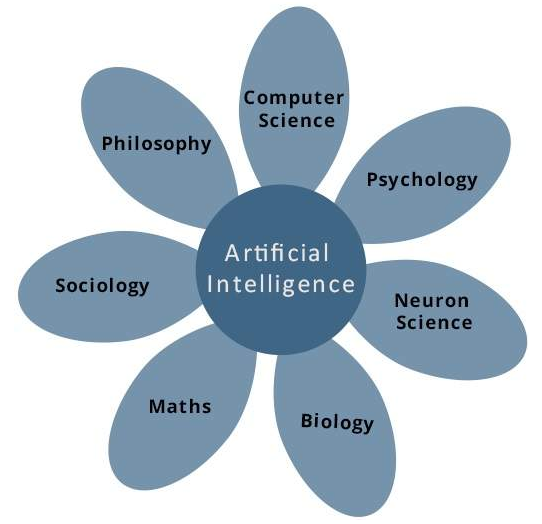
Programming with and without Artificial Intelligence (AI)
| Programming with AI | Programming without AI |
|---|---|
| AI programs can absorb new modifications by using highly independent pieces of information together. Therefore you can modify even a minute piece of information in a program without affecting its structure. | Modification in a program leads to change in its structure. |
| A computer program with AI can answer the generic questions it is meant to solve. | A computer program without AI can answer the specific questions it is meant to solve. |
| Easy and quick program modification. | Modification is not quick and easy. It may result in affecting the program adversely. |
Application of Artificial Intelligence (AI)
- Expert Systems – There are various applications which integrate machine, special information and software to impart advising and reasoning. These systems provide explanation and advice to the users.
- Gaming – AI plays major role in strategic games such as poker, chess, tic-tac-toe, etc. Using artificial intelligence the machine can think of large number of possible moves based on general knowledge.
- Natural Language Processing – Using natural language processing it is possible to interact with a computer that can understand natural language spoken by humans.
- Vision systems – These systems interpret, understand, and comprehend a visual input on the computer.
- Intelligent Robots – Robots are designed for performing the tasks given by a human. They have sensors embedded to detect physical data from the outside environment such as heat, light, sound, pressure, etc. They have multiple sensors, efficient processors and large memory, to exhibit intelligence. In addition, they are capable to learn from their mistakes and they can easily adapt to the new environment.
Types of Robots
1) Mobile Robots
Mobile robots are able to move from one location to another location using locomotion. It is an automatic machine that is capable of navigating an uncontrolled environment without any requirement of physical and electromechanical guidance devices. Mobile Robots are of two types:
(a) Rolling robots –
Rolling robots require wheels to move around. They can easily and quickly search. But they are only useful in flat areas.
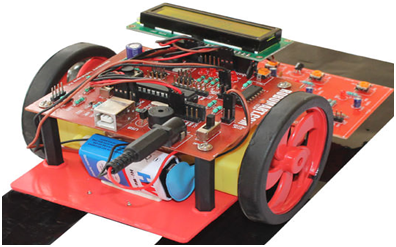
(b) Walking robots –
Robots with legs are usually used in condition where the terrain is rocky. Most walking robots have at least 4 legs.
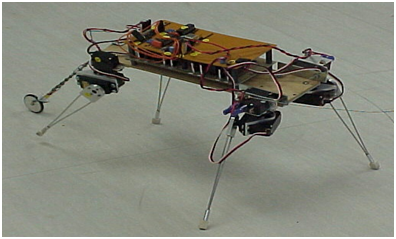
2) Industrial Robots
Industrial robots perform same tasks repeatedly without ever moving. These robots are working in industries in which there is requirement of performing dull and repeated tasks suitable for robot.
An industrial robot never tired, it will perform their works day and night without ever complaining.
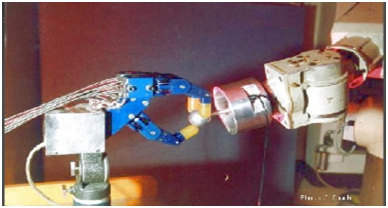
3) Autonomous Robots
Autonomous robots are self-supported. They use a program that provides them the opportunity to decide the action to perform depending on their surroundings.
Using artificial intelligence these robots often learn new behavior. They start with a short routine and adapt this routine to be more successful in a task they perform. Hence, the most successful routine will be repeated.
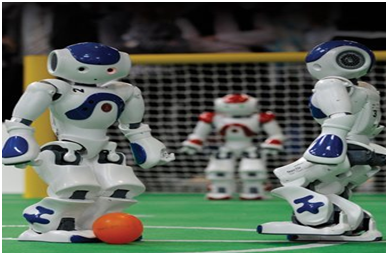
4) Remote Controlled Robots
Remote controlled robot used for performing complicated and undetermined tasks that autonomous robot cannot perform due to uncertainty of operation.
Complicated tasks are best performed by human beings with real brainpower. Therefore a person can guide a robot by using remote. Using remote controlled operation human can perform dangerous tasks without being at the spot where the tasks are performed.
Let’s see a NASA robot designed to explore volcanoes via remote control:
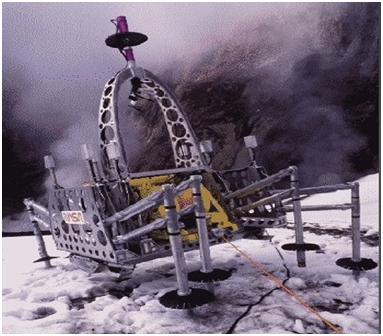
Components of a Robot
Robots are constructed with the following −
- Power Supply − The robots are powered by batteries, solar power, hydraulic, or pneumatic power sources.
- Actuators − They convert energy into movement.
- Electric motors (AC/DC) − They are required for rotational movement.
- Pneumatic Air Muscles − They contract almost 40% when air is sucked in them.
- Muscle Wires − They contract by 5% when electric current is passed through them.
- Piezo Motors and Ultrasonic Motors − Best for industrial robots.
- Sensors − They provide knowledge of real time information on the task environment. Robots are equipped with vision sensors to be to compute the depth in the environment. A tactile sensor imitates the mechanical properties of touch receptors of human fingertips.
Applications of Robotics
The robotics has been instrumental in the various domains such as −
- Industries − Robots are used for handling material, cutting, welding, color coating, drilling, polishing, etc.
- Military − Autonomous robots can reach inaccessible and hazardous zones during war. A robot named Daksh, developed by Defense Research and Development Organization (DRDO), is in function to destroy life-threatening objects safely.
- Medicine − The robots are capable of carrying out hundreds of clinical tests simultaneously, rehabilitating permanently disabled people, and performing complex surgeries such as brain tumors.
- Exploration − The robot rock climbers used for space exploration, underwater drones used for ocean exploration are to name a few.
- Entertainment − Disney’s engineers have created hundreds of robots for movie making.
Conclusion:
Robots are useful in many ways. Therefore, having robots helps business owners to be competitive, because robots can do jobs better and faster than humans can, e.g. robots can built, assemble a car. Yet robots cannot perform every job; today robots roles include assisting research and industry. Hope you have found all the details that you were looking for, in this article.

